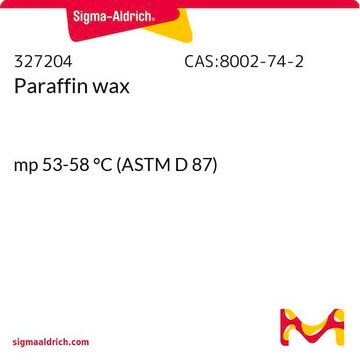1.07164
Paraffin pastilles
solidification point about 56-58°C for histology
Synonym(s):
Paraffin pastilles, Paraffin pastilles solidification point, Paraffin for Histology
About This Item
Recommended Products
Quality Level
form
solid
potency
>5000 mg/kg LD50, oral (Rat)
>3000 mg/kg LD50, skin (Rabbit)
IVD
for in vitro diagnostic use
color
white
kinematic viscosity
4.2 cSt(100 °C)
transition temp
flash point >100 °C
density
0.9 g/cm3 at 20 °C
application(s)
diagnostic assay manufacturing
hematology
histology
storage temp.
15-25°C
General description
Application
- Clinical application of targeted tumour sequencing tests for detecting ERBB2 amplification and optimizing anti-HER2 therapy in gastric cancer.: This study demonstrates the use of paraffin-embedded tissue samples in targeted tumor sequencing to identify patients suitable for anti-HER2 therapy, highlighting paraffin′s utility in preserving sample integrity for genetic analysis (Ichikawa et al., 2024).
- Novel FFPE proteomics method suggests prolactin induced protein as hormone induced cytoskeleton remodeling spatial biomarker.: Describes a novel proteomics method using formalin-fixed paraffin-embedded (FFPE) samples to identify biomarkers for hormone-induced changes in cellular structures, advancing tissue-specific molecular diagnostics (Faktor et al., 2024).
- TSWIFT, a novel method for iterative staining of embedded and mounted human brain sections.: Introduces TSWIFT, a new technique for the iterative staining of paraffin-embedded human brain sections, providing enhanced imaging capabilities for neurological research (Porter et al., 2024).
- [Optimal melanin removal methods for HE staining, immunohistochemistry and molecular detection].: Investigates various methods for melanin removal in HE staining processes involving paraffin-embedded samples, crucial for accurate histopathological and immunohistochemical analyses (Zhang et al., 2024).
- Novel Histopathological Findings of Micro Bone Fragments and Epithelial Response in the Oral Mucosa in Bisphosphonate-Related Osteonecrosis of the Jaw.: This case report utilizes paraffin-embedded sections to uncover novel histopathological insights into osteonecrosis, demonstrating paraffin′s role in detailed structural analysis in pathological conditions (Koizumi et al., 2024).
Storage Class Code
11 - Combustible Solids
WGK
nwg
Flash Point(F)
Not applicable
Flash Point(C)
Not applicable
Certificates of Analysis (COA)
Search for Certificates of Analysis (COA) by entering the products Lot/Batch Number. Lot and Batch Numbers can be found on a product’s label following the words ‘Lot’ or ‘Batch’.
Already Own This Product?
Find documentation for the products that you have recently purchased in the Document Library.
Customers Also Viewed
Related Content
Learn about the criticality of biological tissue staining for research and clinical pathology using standard and special stains and dyes.
Learn about the criticality of biological tissue staining for research and clinical pathology using standard and special stains and dyes.
Learn about the criticality of biological tissue staining for research and clinical pathology using standard and special stains and dyes.
Learn about the criticality of biological tissue staining for research and clinical pathology using standard and special stains and dyes.
Our team of scientists has experience in all areas of research including Life Science, Material Science, Chemical Synthesis, Chromatography, Analytical and many others.
Contact Technical Service










